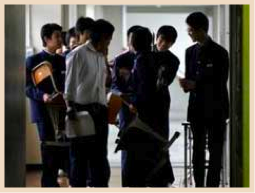
Todd Jay Leonard, Blog


In my last column, I discussed "ijime" or bullying in Japan. This column continues upon that same thread, further illustrating the grave situation facing Japanese youth, the educational system and society at large.
Students do not have many options in removing themselves from being terrorized by bullies. It is often difficult for bullied students to change schools in Japan, especially for elementary or junior high schools, because the custom is to attend the school nearest to the children's homes. Besides, if the child lives in a small town, then there is likely no other choice but to attend the one public school.
There are also documented cases where students simply refused to go to school, missing an entire academic year or more. This, for obvious reasons, is not a solution to the problem.
"Home schooling" is virtually unheard of here in Japan, as well, with only a few families opting to home school. These families, ironically, are sometimes bullied by society for choosing not to follow a standard form of education for their children.
A new trend that has been reported recently are nontraditional schools that are specifically geared to the "square pegs" or students who have a difficult time fitting in socially to the more mainstream schools. These schools are few and far between, but in more cosmopolitan areas, they are gaining in popularity and are being more formally recognized as alternatives to the traditional public school system.
One of the main problems with bullied students staying in their regular schools is that when they are bullied, they are also ostracized from the group, making them outcasts. For the bullied students to tell their parents or teachers would mean that they are bringing more attention to the fact that they do not fit into the "group."
This type of mental or emotional bullying is often as heinous and, in the long run, more damaging to the child as is physical abuse by the bullies. Also, telling an adult puts the bullied child further at risk if it is found out by the bullying group that the child told on them.
A bullied child often suffers in silence, hoping the situation will get better. Usually it doesn't, and the situation is exacerbated - like sharks to blood in water, bullies prey upon the weak and disenfranchised.
The group mentality that is rather pervasive in Japan further complicates the problem. Students tend to side with the majority. Once a child is singled out by the group, they often endure even more bullying from an even larger cross-section of the student population.
One particular example of this, which saddened me greatly, occurred a number of years ago in Tokyo. It involved a student who was made a mockery by his classmates. During class, the students in the boy's class decided to mimic a funeral for him. They teased him incessantly about not being worthy to be alive. They forced him to lie on desks as if he were dead. The students all signed a "funeral card." More shocking, though, was that the teacher also signed the fake funeral card.
All in fun? I think not; especially not to the poor boy who was humiliated and made to feel worthless by the bullying. He committed suicide shortly after this dreadful spectacle.
The current bullying issue in Japan also involves the attitude of schools and boards of education in trying to cover up suicide cases in order to save face. Recently, a number of suicides - which were initially deemed not to be the result of peer bullying - have been reversed and are now finally being regarded as being directly caused by bullying.
Until this reversal, some school administrators tried to claim that there was insufficient evidence to prove bullying was a factor in a number of the suicides that occurred in their school systems. This is all the more unbelievable when considering that a number of the children had left detailed suicide notes naming the perpetrators.
I credit the tireless efforts of the grieving parents in these cases who diligently pushed forward, refusing to accept the conclusions of these schools that the children weren't bullied.
One father finally received vindication when school administrators visited his home to pay their respects at his child's Buddhist altar. They apologized for failing to recognize the child's death as a bullying-related suicide. The father was so dignified in his response to them. He said that he hoped that if anything good could come from his ordeal, it would be to help prevent a similar occurrence from happening to another family.
Suicide due to bullying in Japan has been a simmering issue for many years. Parents feel helpless in protecting their children; schools have traditionally turned a blind eye to the problem.
Now that it has exploded onto the front pages of newspapers, and is the lead story on nightly newscasts, hopefully something concrete will be done to put an end to bullying in schools. Prime Minister Abe does seem serious about the issue.
Let's hope for the sake of students still at risk that he is ... and something more than political policy is implemented quickly to put an end - once and for all - to this malignancy that is chipping away at Japan's educational system, and ultimately its soul.
By TODD JAY LEONARD
Columnist
Education system in crisis
Bullying in Japanese schools is a serious problem
Monday, January 15 , 2007







